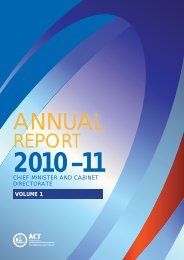Governing the City State - Chief Minister and Treasury Directorate ...
Governing the City State - Chief Minister and Treasury Directorate ...
Governing the City State - Chief Minister and Treasury Directorate ...
You also want an ePaper? Increase the reach of your titles
YUMPU automatically turns print PDFs into web optimized ePapers that Google loves.
Streng<strong>the</strong>ning Budget Discipline <strong>and</strong> AlignmentThe annual Budget cycle, broadly speaking involves consideration of two types of proposals:• funding for (often dem<strong>and</strong> driven) budget pressures; <strong>and</strong>• proposals for an expansion in <strong>the</strong> scope of existing services or for new services.Unless <strong>the</strong> ACT Government’s strategic planning <strong>and</strong> service frameworks are broughttoge<strong>the</strong>r <strong>and</strong> coordinated through <strong>the</strong> annual Budget process, achievement of key strategicgoals will be compromised. Budget <strong>and</strong> service strategies are inextricably combined <strong>and</strong>essential to each o<strong>the</strong>r. If <strong>the</strong> Budget process is a weak link in <strong>the</strong> machinery of government,<strong>the</strong>n all government strategies <strong>and</strong> priorities are put at long-term risk.Currently, <strong>the</strong> focus of <strong>the</strong> debate in <strong>the</strong> Budget Committee of Cabinet is on accommodating<strong>the</strong> spending proposals within <strong>the</strong> fiscal envelope. In effect this drives an incrementalapproach to budgeting, to which <strong>the</strong> majority of existing expenditure is invisible.A consistent view emerged through consultations that <strong>the</strong> annual Budget process involvesunnecessary work for <strong>Minister</strong>s <strong>and</strong> <strong>the</strong> ACTPS, is <strong>the</strong>refore inefficient <strong>and</strong> could besupported better by officials. The view was also expressed that <strong>the</strong> constraints of <strong>the</strong>Appropriation Framework <strong>and</strong> current custom of a single appropriation bill each year fostersperverse incentives that again manifest <strong>the</strong>mselves in inefficiency <strong>and</strong> unnecessarilyadversarial approaches.An annual Budget cycle without a st<strong>and</strong>ing capacity to vary appropriations through <strong>the</strong> yearcreates perverse incentives to underestimate <strong>the</strong> cost of a proposal or inflate ambit claims in<strong>the</strong> Budget process, <strong>and</strong> makes holding <strong>the</strong> line on spending within budget rules almostimpossible. It also encourages – rightly – <strong>the</strong> current Department of <strong>Treasury</strong> to be reluctantto advise <strong>the</strong> Treasurer to agree to requests to access <strong>the</strong> Treasurer’s Advance through <strong>the</strong>year. In this context, <strong>the</strong> definition of “urgent <strong>and</strong> unforeseen” tends to be stretched byagencies <strong>and</strong> overprotected by <strong>Treasury</strong>.Budget discipline is also undermined by an entrenched belief that <strong>the</strong> fiscal situation willalways be better in <strong>the</strong> final result than forecast. While fluctuations in <strong>the</strong> final resultcompared to Budget in every jurisdiction are inevitable, <strong>the</strong> accuracy of estimates for matterswithin <strong>the</strong> ACT Government’s control is strong. Spending proposals would be managedbetter by a rule that if expenditure exceeds what is estimated, offsetting savings must befound from within <strong>the</strong> same <strong>Directorate</strong>.In addressing <strong>the</strong>se issues, one option would be to delay <strong>the</strong> ACT Government budget untilafter <strong>the</strong> Commonwealth Government delivers its Budget. Given <strong>the</strong> significance ofCommonwealth Government grants to ACT Government revenues, <strong>and</strong> <strong>the</strong> Australian PublicService to <strong>the</strong> ACT economy, <strong>the</strong>re is scope for material changes to <strong>the</strong> ACT Budget positionas a result of every Commonwealth Budget. This proposed approach would permit <strong>the</strong> use ofpublished Goods <strong>and</strong> Services Tax revenue estimates in <strong>the</strong> ACT Budget decision makingprocess – at present <strong>the</strong> <strong>Treasury</strong> uses an estimate – <strong>and</strong> allow <strong>the</strong> Australian Government’simpact on <strong>the</strong> broader economy to be taken into account.Strategy, Resource Allocation <strong>and</strong> <strong>the</strong> Vacant Middle Ground: 235


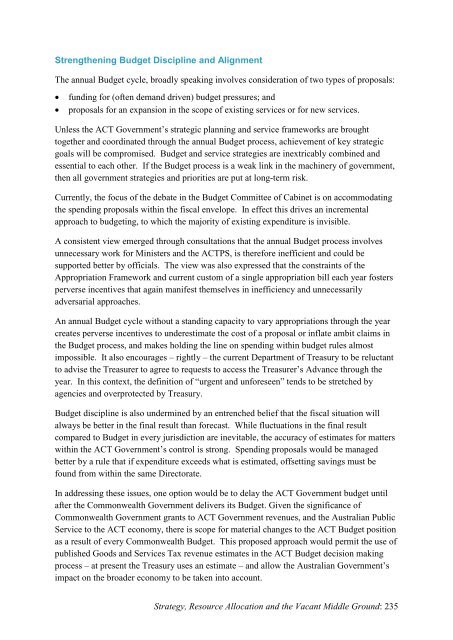
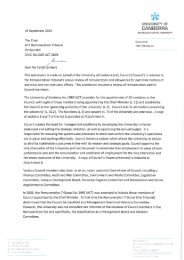
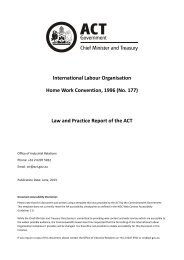
![HSR Training Programs Guidelines [ PDF 191KB]](https://img.yumpu.com/51348280/1/190x245/hsr-training-programs-guidelines-pdf-191kb.jpg?quality=85)


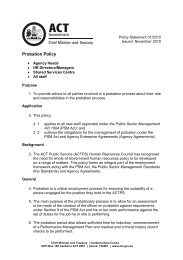
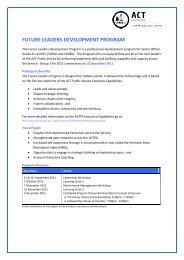


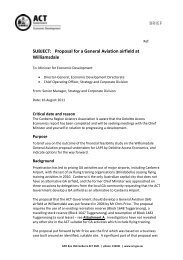
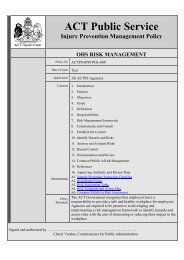
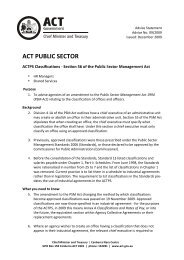
![Teachers Technical and Further Education [ PDF 68KB]](https://img.yumpu.com/34230751/1/184x260/teachers-technical-and-further-education-pdf-68kb.jpg?quality=85)
